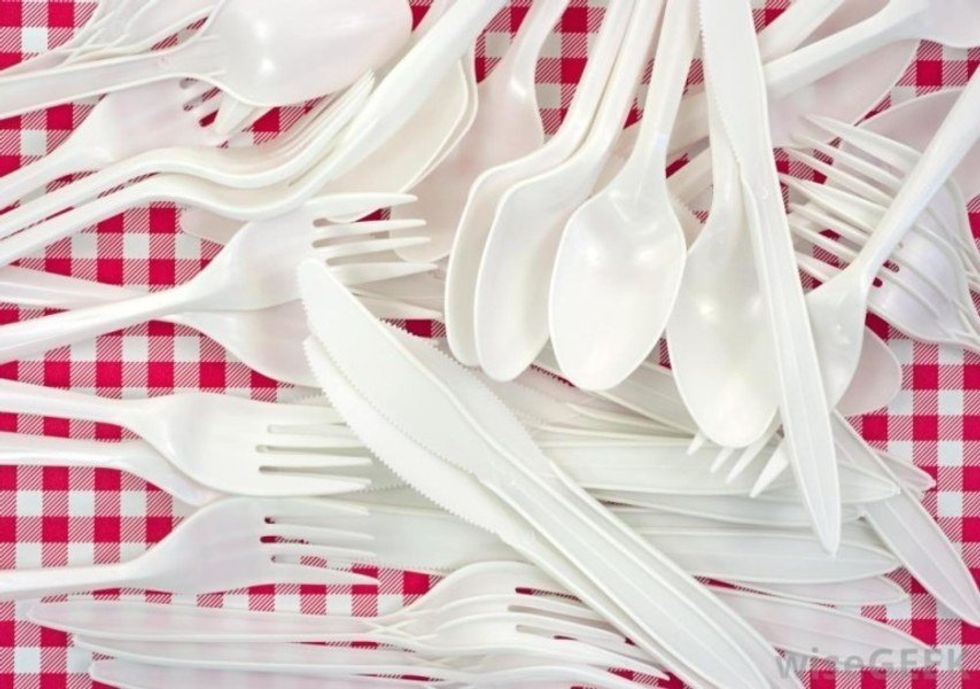In France, picnics are now a plastic-free affair: under a historic new ban, 'nature-lovers' visiting the countryside will no longer be able to buy plastic goblets to drink their fine wine or plastic knives to butter their classic baguettes.
With a logical move, France, a country known to revel in the finer things, has become the first country to pass a ban on plastic cutlery, plates and cups. The new measure gives producers until 2020 to ensure that all disposable dishes sold in France are made of biologically sourced materials and can be composted. The new law will be a part of France’s Energy Transition for Green Growth Act, which has already set a ban on disposable plastic bags throughout the country. The law will only allow disposable tableware made from 50% biologically-sourced materials that are degradable.
While several other countries have attempted to pass laws limiting the usage of plastic material, France is the first country to successfully impose a blanket ban on plastic dishware. France has empirically been at the forefront of environmental progress, and its socialist government has been pushing itself to become a world leader in the conservation of the environment. In 2015, France hosted the 2015 Paris Climate Conference, or COP21, which aimed to achieve a legally binding and universal agreement on climate for the first time in over 20 years of United Nations negotiations, with the specific aim of keeping global warming below two degrees celsius.
French president François Hollande said the new law against disposable plastic tableware would make his country “an exemplary nation in terms of reducing greenhouse gas emissions, diversifying its energy model and increasing the deployment of renewable energy sources.”
The measures were introduced to combat the negative environmental effects of the human era that is quickly coming to be known as "The Age of Plastic." Plastic requires the use of fossil fuels to produce, which are the primary source of direct emissions. Once produced, plastic products are not biodegradable and usually wind up languishing in garbage dumps and producing waterways and airways, subsequently resulting in adverse effects on wildlife. Annually, tens of thousands of seals, whales, birds and turtles die from plastic bags pollution in the ocean. A recent study found that one in three Leatherback sea turtles have plastic in their stomachs. Mankind's abuse of plastic has become so widespread, in fact, that by mid-century plastic is expected to form its own layer of the Earth and appear in fossils.
Environmentalists and government officials are hopeful that other countries and regions will follow suit and implement laws banning the excessive use of plastic. The United States is particularly being pushed to implement plastic-preventative measures due to its status as the largest consumer of plastic products in the world; it is estimated that a United States ban on plastic bags would result in 253 billion less bags polluting landfills and oceans every year. In the Los Angeles area of the United States alone, 10 metric tons of plastic fragments –like grocery bags, straws and soda bottles– are carried into the Pacific Ocean every day. In accordance with this statistic is the presence of the Great Pacific Garbage Patch, a sickening site in the Pacific Ocean where garbage goes to die (or rather, to kill), located off the coast of California. This floating mass of plastic is twice the size of Texas and hosts millions of pounds of plastic which outnumbers marine life six to one with its pieces.
A worldwide ban on plastic would not only protect wildlife from the product's harmful effects, but mankind as well. Plastic fragments in the ocean such as those from plastic bags can absorb pollutants including PCBs (polychlorinated biphenyl) and PAHs (Polycyclic aromatic hydrocarbons), which are known to be hormone-disrupting chemicals. When marine organisms consume plastics in our oceans, these chemicals can make their way through the ocean’s food web and subsequently into humans who eat fish and other marine organisms. Even people who are not seafood fans are still susceptible to plastic's harmful effects on the human body; plastic chemicals can be absorbed by the body, and 93 percent of Americans age six or older test positive for BPA, a plastic chemical which can have adverse side effects ranging from toxicity to immune system suppression and birth defects.
The deterimental impacts of plastic are evident, and France's monumental ban on plastics sets a precedent which, with hope and campaigns by concerns citizens of the world, may lead other countries to follow suit. The path to a clean environment is not easy, but it may be near. In the meantime: "Vive la France" indeed.





















